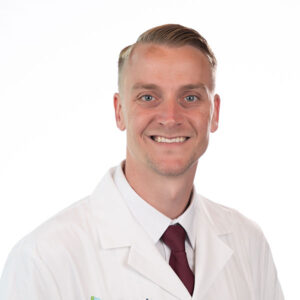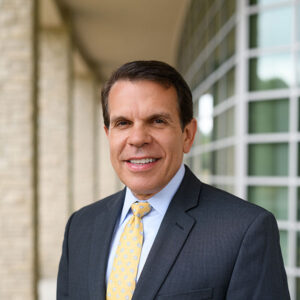Using his total skill set and robotics brings satisfaction to CHI Saint Joseph Health surgeon in rural Kentucky
LONDON Being pigeonholed into one surgical specialty was not going to work for Nicholas Capal, DO, MS, general surgeon with CHI Saint Joseph Health in London, a rural community in Laurel County in Southeastern Kentucky. “Fixing people who are sick, right in the OR with my hands, dealing with whatever comes through the door, is what I signed up for. It’s what I love to do,” says Capal.
Capal, a Cincinnati native, received his undergraduate and master’s degrees in biology at the University of Cincinnati. He received his medical training and degree at the Lake Erie College of Osteopathic Medicine in Erie, Pennsylvania. He then did his residency in general surgery at Mercy Health-St. Elizabeth Youngstown Hospital, a community-based hospital and level one trauma center in Ohio.
Capal says the years he spent in Youngstown were invaluable training for him. “We were a community hospital and level one trauma center, so we did everything from car crashes and gunshot wounds to elective surgery. I learned so much working there, including that I wanted to do general surgery in a rural community hospital setting. Saint Joseph London was a perfect match for me,” he says.
Capal joined CHI Saint Joseph Health in August 2023. In a press release, Capal said his decision to join Saint Joseph London was influenced by both professional and personal reasons. He was already familiar with the area, as he had family members living in the region for 15 years.
Furthermore, he states, “the warm and inviting atmosphere convinced me that this was the ideal place for me to practice medicine and provide exceptional patient care where it’s needed. I like the ability to manage a wide range of issues, and I like this patient population because they are very grateful for the help that they receive.”
Eighteen months later, Capal says his appreciation and commitment to the London community has grown even stronger. With the help of his colleagues, fellow surgeons Katie Blair, MD, and Don Morring, MD, the Saint Joseph London surgery team has a common goal of keeping patients local, not transferring them to Lexington unless it’s absolutely necessary.
“A lot of times we see patients on their worst day, when surgery is needed. They are sick, often scared. We don’t want to add to that fear by transferring them 70 miles up the interstate, away from their family and home. We are also in close contact with their other doctors, their primary care, their oncologist, or their cardiologist. If there are any complicating issues, we know just whom to call,” says Capal.
“Certainly, if it’s in the patient’s best interest, we’ll transfer them to a larger hospital with more specialized services, but most of the time, we are trained to do what’s necessary right here in London. And patients feel more comfortable being close to home and family,” says Capal.
Robotics Enters the Picture
Capal says his number-one priority for improving surgical outcomes in London was acquiring the da Vinci robotic surgical system, which occurred in February 2025 when the hospital acquired the da Vinci Xi. Capal performed the first surgery with the new robot at Saint Joseph Hospital London on February 5.
“The da Vinci robot is the gold standard for robotic surgery,” says Capal. “Using the da Vinci Xi is like having two extra hands in the operating room. I guide the instruments via a console while looking through an advanced 3D vision system that gives me a better view of the anatomy.”
Since its introduction into surgical use in the U.S. in 2000, the da Vinci robotic surgical system has revolutionized minimally invasive surgeries and has been proven to provide better outcomes. It is used in abdominal, hiatal, uterine, and prostate surgeries.
“Most patients experience much less postoperative pain than traditional open surgeries, reducing the need for opioid pain medications, even after more involved hernia surgeries,” says Capal. “Adding the da Vinci Xi to our operating room is a significant advancement in the surgical care we provide at Saint Joseph London. Our goal is to bring as many types of procedures as possible to our community, so our patients with complicated medical concerns don’t feel like they have to travel out of town for surgery.”
John Yanes, president, Saint Joseph London, concurs. “We are always looking for ways to raise the bar and provide the latest in care for our patients. Patients in southeastern Kentucky need only to travel to London for access to surgeries with this advanced technology, which provides a quicker recovery time than traditional surgical procedures,” says Yanes.
Patients in Southeastern Kentucky
Like other internal medicine specialties, general surgeons see the effects of poor health habits, lifestyle, and lack of access to healthcare in their patients. Obesity can complicate abdominal surgery, says Capal, but the da Vinci robot is an asset with the 360° articulation in the robot’s hands. “The robot can get to places to make cuts in a way that a straight laparoscopic tool cannot,” he says.
Capal says that unfortunately he is seeing cancer in younger patients, in their 20s, 30s and 40s, a trend that is reflected in national statistics. “I did cancer tumor resection surgeries on a 20-year-old and a 30-year-old last year,” he says.
A particular life-saving surgery occurred when a female car crash victim was brought into his OR. “She was literally dying in front of me on the operating table from massive abdominal injuries,” he recalls. “We were able to surgically stabilize her and then helicoptered her to UK trauma, where she survived and recovered. I found out recently that she is related to one of our staff members. That made her story personally very rewarding for me,” says Capal.
When discussing elective, or even emergent, surgeries with his patients, Capal says straightforward, easy to understand, and open communication is key.
“I tend to take extra time talking to my patients. And it is my duty as their surgeon to be able to break down complex medical and surgical problems and simplify them into terms they can understand. I try to explain what is going on, why it’s going on, and what we can do to fix it. We need to have a common understanding of the decision to proceed with
surgery. After our conversation, I frequently ask my patients to explain, in their own words, what surgery we will be doing and why. Because I believe if a patient cannot do that, and does not understand what the basic problem is and the steps we can take to fix it, then I have failed them as their doctor.”
“How grateful my patients are to have top quality care close to home is my motivation. It’s why I’m here, doing what I love to do,” says Capal.





